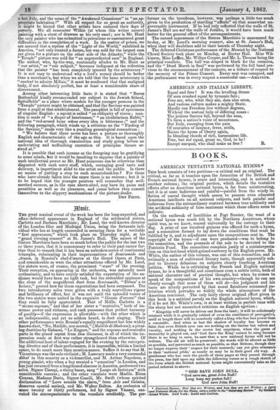31ingir.
THE great musical event of the week has been the long-expected, and often-deferred appearance in England of the celebrated sisters, Carlotta and Barbara Marchisio ; Mr. Land, the well-known director of the London Glee and Madrigal Union, being the fortunate indi- vidual who has at length succeeded in securing them for a veritable "first appearance," which took place on Thursday night, at his "grand evening concert" at St. James's Hall. The names of the Sisters Marchisio have been so much before the public for the last two or three years, that it is unnecessary to refer to their past career fur-
- ther than to remark that it has been an unbroken series of continental triumphs, culminating in their impersonations of Sentiramide and Armee, in Rossini's chef-d'oeuvre at the Grand Opera at Paris, and considerable as were the other attractions offered by Mr. Land, the sisters were, of course, the prominent "stars" of the evening. Their reception, on appearing in the orchestra, was naturally most enthusiastic, and to have merely satisfied the expectation of the au- dience would have been no light task, but the redoubled applause at the close of theficent duet from Sevriravaide, "Ebben' a to
ferisce," proved how far expectations had been surpassed. The two introductory solos were given with a truly marvellous vigour and brilliancy of effect, but it was not until the splendid voices of the two sisters were united in the exquisite " Giorno d'orrore" that they could be fully appreciated. That of Mdlle. Carlotta is a "mezzo soprano," and that of her sister a "contralto," both of im- mense power and richness, and each possesses that perfect harmony of quality—if the expression is allowable—with the other which is so indispensable, and yet so seldom heard, in duet singing. Their other performances were Rossini's equally magnificent but less widely known duet, "No, Matilde, non morsel," (Matilde di Shabratt); a pleas- ing duettino by Gabnssi, "Le Zingare," and the soprano and contralto parts in the grand septet from Don Giovanni, in all of which the im- pression made at first was rather strengthened than otherwise. Of the additional host of talent engaged for the evening by the enterpris- ing director and of their performance, it is impossible, within a limited space, to do much more than mention names. Suffice it to say that M. Vieuxtemps was the solo violinist; M. Lamoury made a very successful debut in this country as a violoncellist, and M. Arthur Napoleon, a young pianist, who when a boy created a "sensation". in London, and has just returned from a lengthened absence in America, performed two solos. Signor Ciampi, a rising bass% Sang "Largo ab factotum" with considerable success ; and the other vocalists were Madlle. Elena Conran, Madame Dario, Signor Coselli, Mr. Swift (whose spirited declamation of "Love sounds the alarm," from _dais and Galatea, deserves special notice), and Mr. Walter Bolton. An orchestra of some twenty or thirty performers, led by Signor Vianesi, sae- asui. vasti:mat rtinsi:otv rithey azit}hVartLetteen,,, sad thie7ilatht:Yrdaar; ZtttiZ"V; Richard cuted the accompaniments to the vocalists creditably. The per- Giant White. New York: Rudd and Carlton.
former on the trombone, however, was perhaps a little too much given to the production of startling "effects" on that somewhat un- governable instrument. If he had only reflected that the walls of St. James's Hall are not the walls of Jericho, it would have been much better for the general effect of the accompaniments. The second appearance of the Sisters Marchisio is announced for to-day, at Mr. Land's morning concert, also at St. James's Hall, when they will doubtless add to their laurels of Thursday night. The deferred Christmas performance of the Messiah by the National Choral Society took place on Monday, at Exeter Hall. Miss Wil- kinson, Miss Leffler, Mr. Wilbye Cooper, and Mr. L. Thomas being the principal vocalists. The hall was draped in black for the occasion, and the "Dead March in Saul" was performed by the full band pre- vious to the commencement of the oratorio, as a tribute of respect to the memory of the Prince Consort. Every seat was occupied, and the performance was in every respect a successful one.—AHATEun.


































 Previous page
Previous page